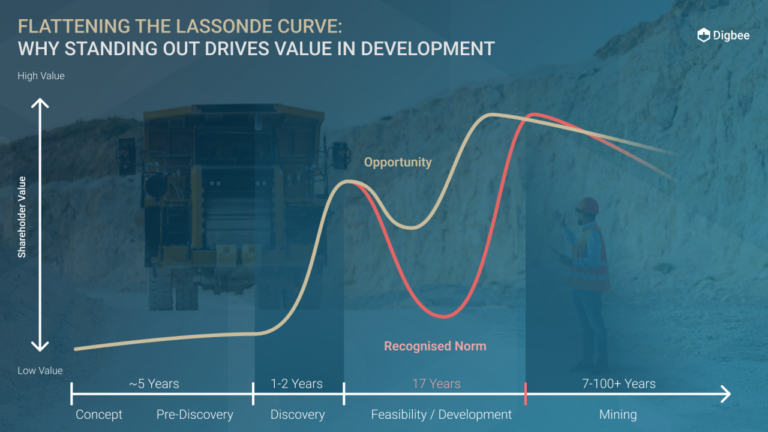Ever felt the world is passing you by? Well, have a thought for the mining industry at present. Reading the global press – mainstream or business – it would be difficult to miss the rush for critical minerals and the need for the West to take back control of its supply chains. For those looking a little deeper, you may have noted the pivotal investment by the auto makers into development stage mining companies, as well as the huge economic support by the US and EU to underpin these strategies.
Markets don’t always work in tandem with global events. Despite the high margins, recent easing of runaway inflation and long-term growth expectations, the major mining companies are trading at less than 5x cash flow and the cost of capital is amongst the highest of all industries. Further, the junior sector – that provides so much of the future minerals discovery – has extreme balance sheet stress, and its access to capital is shrinking.
As the saying goes, “Bear markets set up Bull markets”. But beyond the context of financial markets, the situation looks even more concerning for the longer-term capabilities of meeting the expected rebound. The Northern Miner reported last month:
- Mining engineering enrolment down 63% in Australia
- Mining program graduations down 39% in the U.S.
- Mining job vacancies in Australia have grown 2x in just 3 years
- In Canada, 70% of youth surveyed said they would NOT consider a career in mining
Perhaps Boards of Directors and Management should consider looking inwards, recognising the world has moved on and embrace means to address its problems, rather than hoping for a price cycle bailout that is beyond the control of anyone.
Building awareness of sustainable practices
The financial community is increasingly embedding sustainability as a priority in their capital allocation process; this is hardly likely to reverse given its fuel is the younger generation entering business.
This has become particularly apparent for the mining sector. Data from Bridgend Capital Advisory shows the big four Australian banks’ combined exposure to mining, oil and gas clients has declined by almost $25 billion since peaking at $64.7 billion in 2015. The Australian Review picked this up and questioned NAB’s previous head of Resources Nick Rees who highlighted that this decline was not because of the risk appetite to ordinary mining risk but “…It is mostly risk appetite around reputational risk and ESG [environment, social and corporate governance], it is those areas that have become much more difficult for banks to navigate than was perhaps the case 10 years ago and that has contributed to banks being a bit less willing to engage”.
As part of a collaborative research exercise with UK investment bank Peel Hunt, it was discovered that the mining sector is regarded in the top quartile of all industries when it comes to sustainability.
So why has the flow of funds to more sustainable industries in recent years completely passed by this sector? Rohitesh Dharwan, CEO of ICMM, recently stated: “The mining industry has lost trust with its stakeholders”. The failure to effectively communicate the positive changes of the past 20 years has undermined any effort to rebuild this trust.
Earning the respect of all stakeholders
One option could be to take leadership from Spotify and the music industry. At the turn of the century, Napster – with over 80m users of pirated music – filed for bankruptcy. There was a complete breakdown of trust between the record labels, the musicians and their fans. Record labels warned consumers that free downloads were akin to shoplifting CDs, while fans were riled by the industry’s attempt to challenge technological progress.
Daniel Ek, Spotify’s founder and CEO, today the world’s largest music streaming brand with approximately 50% of the world’s paying users, rebuilt trust by engaging with rather than against its core stakeholders and opened up a period of exceptional growth for the industry.
The dilemma is that society believes mining continues to plunder the earth with unstructured environmental damage, child labour and no governance – a legacy that has been impossible to shift despite the fundamental changes to developing and operating mines over the past 25 years and the evidence from the Thompson Reuters data.
Weber Shandwick recently provided research that stated 76% of a company’s market capitalization is down to reputation. Reputation can be earned (and lost!), there are leaders within the mining sector that have shown success of reputation such as the late Lukas Lundin, Robert Friedland and Ross Beaty – all of these have long term credentials of strong governance, delivering mines that benefit their local communities and mitigate environmental impact and risk.
Daniel Davidson, MD of the Gates/Bezos Energy Breakthrough Ventures fund, MIT professor and well-respected Silicon Valley venture capitalist was commenting at PDAC conference on the dismal valuations of the mining sector. He then posed a question:
“What would the valuation be of a well-respected, ESG embracing, reasonably well-sized mining company with exciting critical mineral production and no legacy to contend with?”
His answer was mid teens of EV/EBITDA – a near 3x uplift to the current valuation of the main diversified miners.
Unlocking the full value of ESG
The mining sector should stop looking over the horizon hoping for a new wave of finance created by a price cycle that it has no means to control. To do so, and without the rebuilding of trust, means any benefit would be muted.
To re-establish trust, deliver lasting value to its stakeholders and drive a dynamic revaluation, the sector should recognise that ESG will become a topic as price sensitive as a resource statement or production data. Its influence on both company and Director reputation has already led to huge change through which effective communication will deliver value in capital markets and society.


